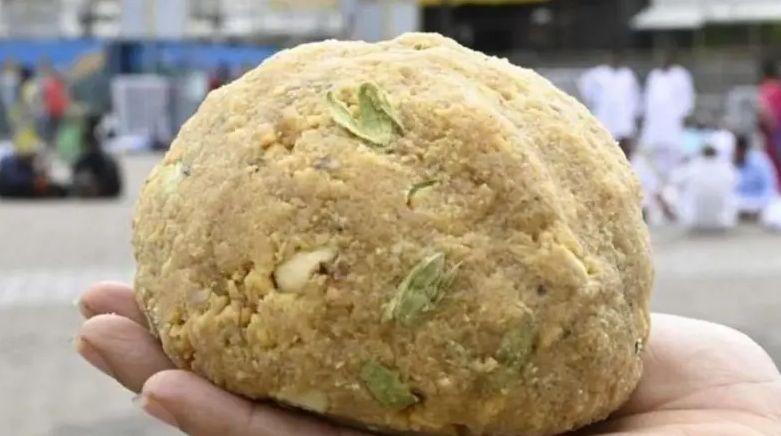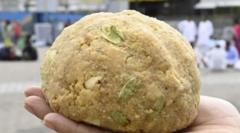
The Tirupati temple in India makes 350,000 laddus every day
Geeta Pandey
BBC News, Delhi
India’s most popular sweet – the laddu – is caught in an unsavoury row.
The controversy erupted last week when Andhra Pradesh Chief Minister N Chandrababu Naidu said that lab reports had shown that laddus offered to the deity and then distributed to devotees every day at the famous Tirupati temple in the state were contaminated with animal and vegetable fat.
He said the ghee (clarified butter) used in the sweets was adulterated with “beef tallow, fish oil and other impurities”. Temple offerings in India are usually vegetarian.
On the face of it, it appeared like a matter of food adulteration – something that authorities in India routinely grapple with, external.
But since Naidu’s announcement, the issue has dominated headlines, caused a major political row and prompted other temples to test their sweets for “purity”.
Image source, Getty Images
The Tirupati temple attracts millions of devotees from India every year
The Tirupati temple in Andhra Pradesh is one of Hinduism’s most sacred shrines. Dedicated to Hindu god Sri Venkateswara – popularly known as Balaji – the temple owns assets worth tens of billions of dollars and attracts nearly 24 million devotees from India and abroad every year.
The famous Tirupati laddus – made with gram flour, sugar, cashews, raisins and cardamom and cooked in “pure cow ghee” – are prized by devotees who consider them god’s blessing and carry them back home to share with family and friends. Reports say more than 350,000 laddus are prepared daily in the temple’s kitchen.
So Naidu’s revelations have been met with dismay, with many religious leaders calling on authorities to protect the sanctity of temples.
“Care should be taken that such great sins are not repeated in a temple that has tens of millions of devotees,” Ramana Deekshitulu, a priest, told news agency ANI.
Swami Avimukteshwaranand Saraswati, another prominent priest, called it “an attack on the faith and belief of tens of millions of Hindus”.
“This is an organised crime and a huge betrayal of Hindus. It should be investigated and strict action should be taken against the guilty,” he told a news channel.
The issue has also turned into a political slugfest after Naidu blamed his rival and former chief minister YS Jagan Mohan Reddy for the “desecration”.
Image source, BBC Telugu
Laddus being made in the Tirupati temple kitchen
Naidu, who was sworn in as the state’s chief minister in June, alleged that the impure laddus were distributed to devotees during Reddy’s term. The temple board is run by the state government, which appoints its chief.
Naidu said he had changed the ghee supplier and formed a special investigation team led by a senior police officer to address the issue.
An angry Reddy has rejected the allegations and accused Naidu of playing politics. In a strongly-worded letter to Prime Minister Narendra Modi, he asked him to “severely reprimand” Naidu, who’s a key ally in Modi’s federal government.
“Naidu is a pathological and habitual liar” who was tarnishing the image of the temple trust with false campaigns, he wrote.
Reddy said even though the temple did not have a lab to check the ghee’s purity, its officials were experienced in identifying impurities by appearance and smell and that there had been instances – both during his government and also earlier when Naidu’s party had been in power – when ghee tankers were sent back to suppliers.
Reddy’s party has also invited people to take part in religious rituals in temples across the state to “atone for the sin” that, they say, Naidu has committed by making allegations about the laddus.
Image source, TTD
A Tirupati priest sprinkled holy water on trays of laddus as part of a purification ritual
Meanwhile, the Tirumala Tirupati Devasthanams (TTD) – the board that manages the nearly 2,000-year-old temple – has been trying to do damage control.
A board spokesperson told reporters that they were sourcing ghee from five companies via tenders. After complaints from pilgrims and laddu makers, they sent samples for lab tests which revealed that four tankers from AR Dairy in Tamil Nadu were of substandard quality.
In response, AR Dairy, which has been producing ghee since 1998 and claims to conduct 102 quality checks on its milk, dismissed the allegations, external as “absurd” and stated that they are “severely damaging to our business.”
It said a quality control officer at the firm had called the allegations that fish oil was added “nonsensical”, as fish oil costs more than ghee, and that “any form of adulteration would be immediately noticeable by its odour”.
The temple, meanwhile, said it had done its own penance. To assure devotees that its laddus were now rid of defects and fit for gods and humans, the priests held a four-hour-long “purification ritual” on Monday.
Photographs, external released by the temple board showed priests sprinkling holy water in the kitchen, on sacks of ingredients and on huge trays of laddus.
Image source, Getty Images
Bollywood stars Abhishek Bachchan and Aishwarya Rai at the Tirupati temple after their wedding in 2007
The controversy, however, refuses to die down and has dominated headlines in the state. Popular actor and the state’s Deputy Chief Minister Pawan Kalyan called the adulteration “an attack on Hindu religion”. Kalyan is also performing what he called 11 days of atonement rituals to rectify the “great injustice”.
Members of a Hindu nationalist group have demonstrated outside Reddy’s home, chanting slogans. They left after painting the gate and walls saffron – a colour that is worn by many Hindu priests and is also the colour of flags of BJP and other Hindu parties.
Authorities in other states have also been rushing to test sweets offered at other Hindu temples, including the famous Krishna temple in Mathura in Uttar Pradesh and the Jagannath temple in Odisha state.
The issue has also found resonance on social media. Laddu, along with hashtags such as #TirupatiLaddu, #TirupatiLadduControversy and #TirupatiLadduRow, has trended for days on X (formerly Twitter), with many expressing their outrage at what they called deliberate attempts to hurt Hindu faith.
Some of this outrage, however, appeared to be manufactured after it was pointed out that many handles pledging support to Hindu nationalist groups had shared images of Reddy wearing a Muslim skullcap and derided him as “anti-Hindu”.
One tweet, shared by many handles two days after Naidu’s allegation, was especially flagged for using identical words by people who appeared unrelated. It said: “For the past 2-3 years, Amma [mother] used to fall sick if she tasted Tirupati laddus and used to tell us not to eat too much of it. We put it on her general paranoia. Now I feel she sensed something was terribly wrong.”

